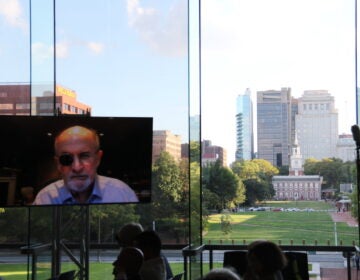Former U.S. attorney general predicts continuing wave of political engagement
Former Attorney General Eric Holder spoke at National Constitution Center to mark 150th anniversary of 14th Amendment

Former United States Attorney General Eric Holder speaks at the National Constitution Center's event, "Keynote Conversation: Equal Protection for All." (Emma Lee/WHYY)
This year marks the 150th anniversary of the 14th Amendment to the U.S. Constitution. Speaking in Philadelphia Monday, former U.S Attorney General Eric Holder said he thinks gerrymandering cases before the U.S. Supreme Court could bring a similar “sea change” to the country.
As it defined the rights of American citizens, the 14th Amendment prohibited the states from enacting any law to negate the basic privileges of citizenship. One of the Reconstruction Amendments, it was passed immediately following the Civil War to protect the rights of newly freed slaves.
Holder was at the National Constitution Center in Philadelphia Monday evening to explain the continuing relevance of the amendment in today’s political landscape.
Sometimes called “America’s Second Founding,” the 14th Amendment recognized all those born or naturalized in the U.S. as citizens. But it also altered the federal government’s relationship with individual state governments.
Holder said he sees three moments in U.S. history of such fundamental change: the American Revolution; these Civil War Reconstruction Amendments; and the civil rights movement.
“I think we’re going to have a fourth iteration, after this era we are presently dealing with,” he said. “There is what I’ve come to call a new American engagement.”
Holder, who said he has noticed an increased enthusiasm for political engagement across the country, pointed to a key component: congressional redistricting and the gerrymandering cases before the U.S. Supreme Court. The cases center on claims the districts have been delineated to favor one political party.
Should the court make a binding decision on redistricting, Holder said, it will be a “sea change.”
“It is why I think the court is wrestling with it as deeply as it is,” he said. “I think they understand that we would be in a fundamentally different place if we finally put limits on partisan gerrymandering.”
The U.S. Supreme Court has heard arguments in gerrymandering cases from Maryland and Wisconsin. On Tuesday, it will consider a case from Texas.
Last month, the court refused to hear an emergency appeal from GOP Republican lawmakers in Pennsylvania seeking to overturn decisions from the state’s high court, which had ruled that Pennsylvania’s congressional map was unconstitutional — and then imposed one of its own.
The high court’s decision not to take the case means that a new congressional map drawn on behalf of the Pennsylvania Supreme Court will be used for this year’s primary and general election. The district boundaries upended many districts that stretched over parts of several counties and generally made them more compact. In doing so, analysts say the map is also more favorable to Democrats.
WHYY is your source for fact-based, in-depth journalism and information. As a nonprofit organization, we rely on financial support from readers like you. Please give today.





